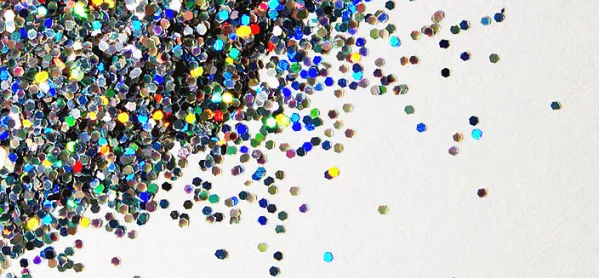Glitter has long been a staple of the primary classroom. Space topic art project? Time to break out the glitter. Making Christmas cards to send home to parents? Glitter is essential.
And yet, recent research suggests that glitter is actually bad for the environment. Several schools have even proposed a ban on using glitter in the classroom as a result.
So, what is all the fuss about?
The problem is that studies have shown that microplastics, including glitter, do not biodegrade. When these tiny particles of plastic are washed down the drain and reach the ocean, they can be consumed by fish, seabirds and other marine life, causing them harm.
Now, as a measure to protect marine environments, scientists such as Dr Trisia Farrelly have gone so far as to suggest that “all glitter should be banned”. And environmental charities have also taken up the cause. Friends of the Earth, for example, have kick-started a movement promoting plastic-free ways to enjoy festivals, including the use of biodegradable body glitter.
But what does this mean for schools? Is a ban on glitter really necessary?
Kevin O’Brien, senior leader and Year 6 teacher at Southfields Academy in Greater London would be in favour of a ban.
“I believe it to be a good idea if solely to reduce the mess and wastage caused from its use. Many a time I have been told off by my cleaner,” he says.
Glitter ban in schools?
However, Gaynor Bright, a foundation stage teacher at Arnbrook Primary School in Nottingham, believes that getting rid of glitter in individual schools would barely scratch the surface of the problem and so it should be up to manufacturers to make their products more environmentally friendly.
“Banning glitter in schools won’t make a huge difference,” she says. “Manufacturing environmentally safe glitter is the answer.”
One thing that O’Brien and Bright agree on, though, is that children should be taught about the harmful impact plastic has on our environment.
“The plastics issue, I feel, is an area that our young children must know about,” says O’Brien. He thinks that the idea of banning glitter can be explored in the classroom, as part of PSHE or science topics.
“We often use BBC series such as Blue Planet in lessons as a stimulus [for talking about the environment],” O’Brien explains.
Gayner, likewise, highlights the importance of teaching pupils more broadly about the effects of human behaviour on the environment so that children “learn to make informed choices”.
‘A step too far’
So, if a blanket ban on glitter was introduced in future, would schools be willing to accept the change?
A recent poll of nursery workers suggests not. Of the 1,092 nursery workers surveyed by reviews website daynurseries.co.uk between January and March this year, only 22 per cent were in favour of banning glitter.
O’Brien points out that this resistance is perhaps not down to teachers’ penchant for the sparkly stuff, but to the fact that banning glitter is simply not currently a top priority for those working in education.
“I would suggest that there are many more important issues such a finance for schools, teacher pay and workload that are much more important than whether glitter should be banned or not,” he says.
Gaynor, likewise, agrees that there are bigger issues to tackle here.
“A proposed ban on glitter is a step too far,” she says. “Education, not banning, is the only way to get our next group of potential adults and leaders to think carefully about their environmental impact.”
Zoya Raza-Sheikh is a freelance writer

